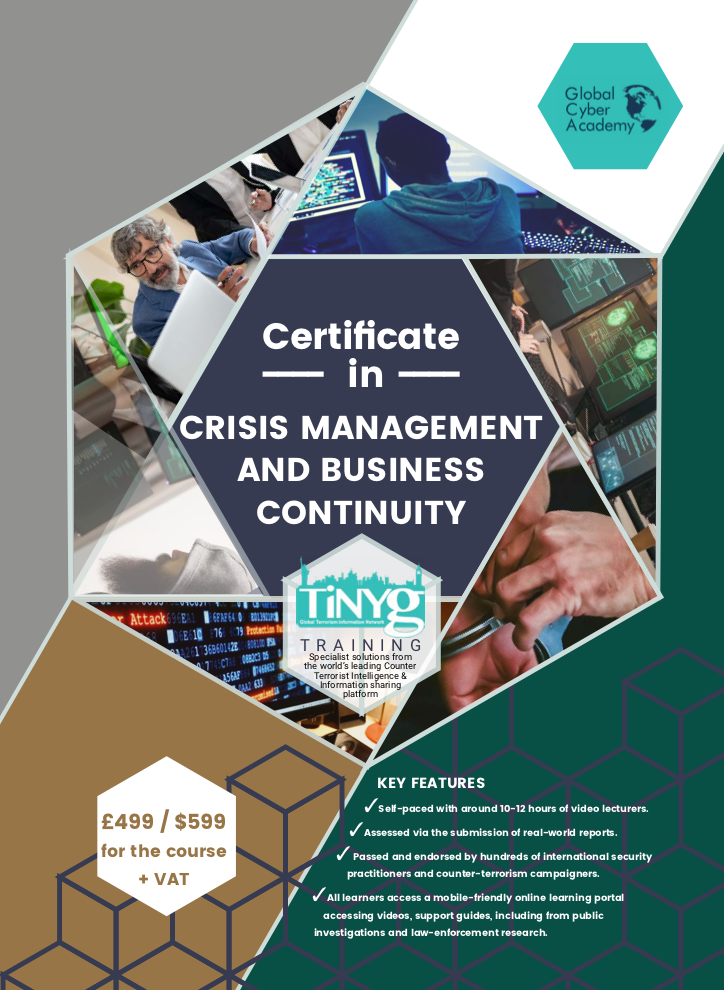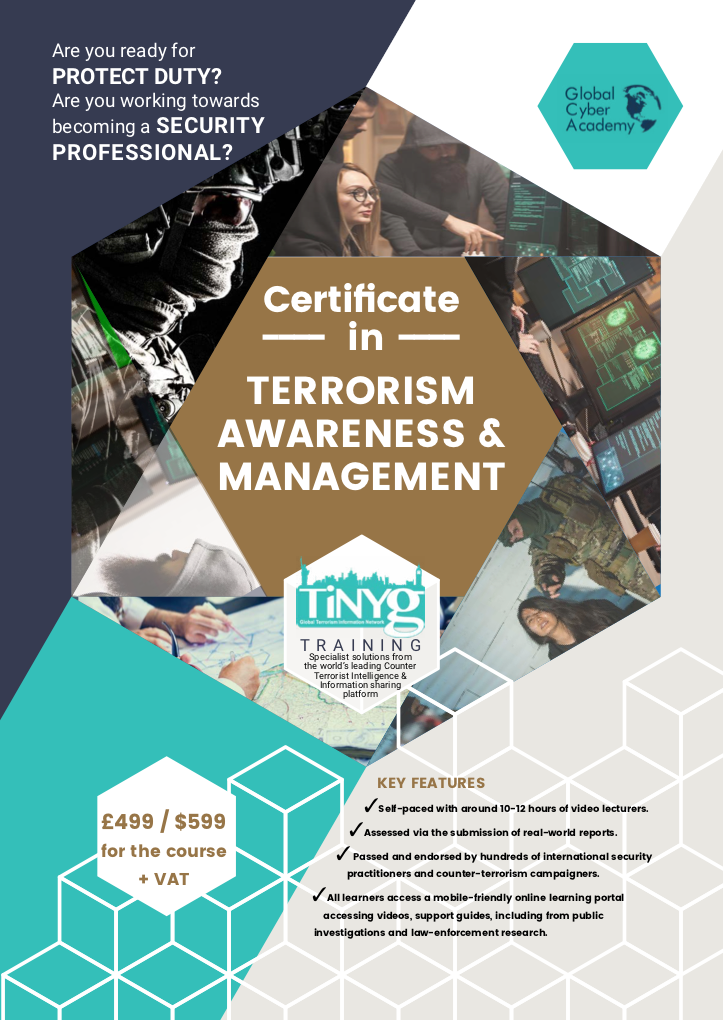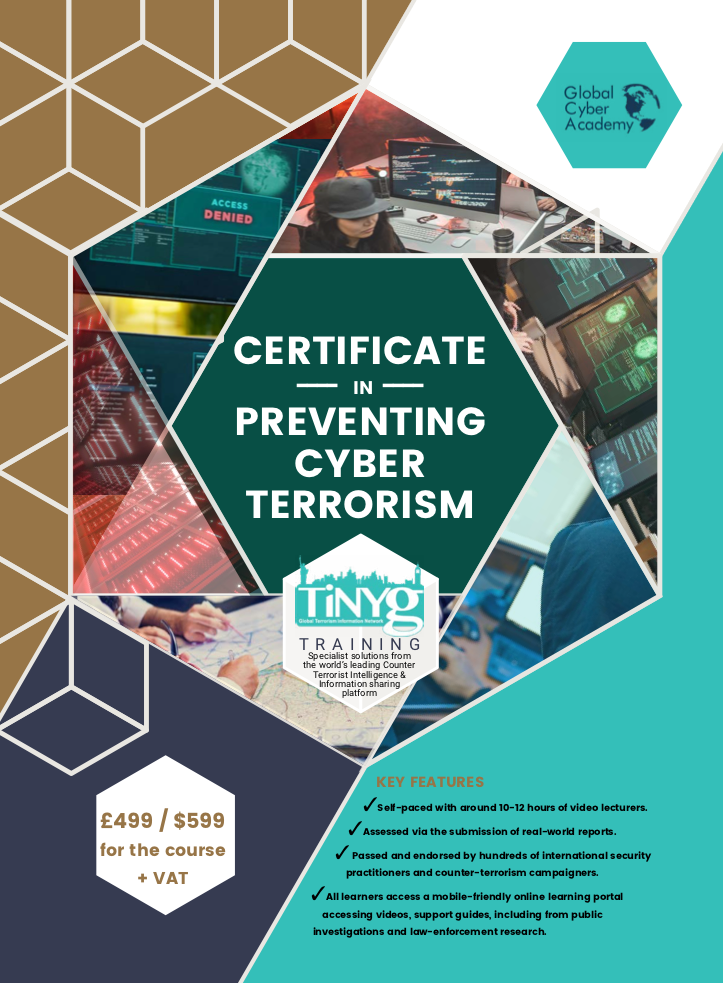Crisis Management & Business Continuity
CERTIFICATE IN CRISIS MANAGEMENT AND BUSINESS CONTINUITY
The course demonstrates how to organize, structure, and respond as a unified team to a crisis. The programme content includes the designing, building, implementing and reviewing of Business Continuity Plans; Incident Response planning, execution and monitoring; Crisis Recovery Strategies of major organisations, and also provides delegates with opportunities to test themselves against hostile media questioning and acute Public Relations challenges.

KEY FEATURES
✓Self-paced with around 7 hours of video lectures plus hours of supporting reading content.
✓Assessed via the submission of real-world reports.
✓ Passed and endorsed by hundreds of international security practitioners and counter-terrorism campaigners.
✓All learners access a mobile-friendly online learning portal accessing videos, support guides, including from public investigations and law-enforcement research.
COURSE INSTRUCTOR
Richard Bingley FHEA PGCLTHE
Senior Instructor in Cybersecurity and Incident Management and author of the book ‘Combatting Cyber Terrorism’.

More Details
WHY THIS CRISIS MANAGEMENT AND BUSINESS CONTINUITY TRAINING IS ESSENTIAL FOR ORGANISATIONS
Who shold Attend?
- This course in non-technical and can be attended by technical and non-technical managers and executives alike.
- Senior Management Teams, CEOs, Chief Operating Officers, HR Managers and Directors, Chief Security Officers, IT Directors, Branch Managers, Aspiring Directors and Managers. Military and Police (closed sessions upon request).
Why Attend?
- Organizations and companies that exhibit weak leadership during a potential or actual crisis lose customers, stakeholders and key employees.
- Poor crisis leaders usually lose their jobs and clients. Provide client confidence in your assurance, continuity and ability to ‘serve to lead’ in your sector.
- To develop your own ‘Crisis Leadership Personal Development Plan’ and your organisation’s strategic business continuity plan.
- To provide reassurance and commitment to your employees, clients and key stakeholders.
- To receive practical experience in dealing with hostile media interviews. Learn how to design and develop a Crisis Communications Plan and receive practical experience in dealing with hostile media interviews.
COURSE INFORMATION
Format: Online
Hours: Self-paced. Pre-corded videos and guides. Around 7 hours of video tutorials plus lots of supporting reading content.
Award: Certificate of Achievement from TiNYg.
Tutor & teaching approach: University teaching qualified and experienced senior lecturer, subject matter expert and sector leader/practitioner in Crisis Leadership & Management, Threat Identification, Communications and Business Continuity. Case studies and ‘real world’ assessments.
Assessment: 2 x ‘real world’ crisis management and business continuity report scenarios.
Virtual Learning Environment: Mobile friendly with videos, study guides and relevant reports from inquiries and other investigations. Access to Virtual Learning Centre including e-library and academic support tools for up to 1 year.
Course Overview
- Mishandling a crisis, or failing to prepare for an emergency, can permanently shut-down or bankrupt an organization and/or lead to serious and highly-visible sanctions against company leaders.
- Many organizational crises in business and public sector institutions begin with a series of small trigger incidents, which – taken together – can come to overwhelm an organization, sector, or nation, before senior-decision-makers are able to organise a response that can mitigate hazards and threats.
- Taking recent lessons from the Covid-19 pandemic response, as well as other key business security events of recent times, this highly-practical course prepares company managers and leaders to accurately anticipate, plan for, respond and recover from crisis scenarios.
- The course demonstrates how to organize, structure, and respond as a unified team to a crisis. The programme content includes the designing, building, implementing and reviewing of Business Continuity Plans, reviews Crisis Recovery Strategies of major organisations, and provides delegates with opportunities to test themselves against media questioning and publicity challenges.
Learning Outcomes
- Understand dominant theories and practices of business resilience and the legal frameworks that apply to ‘organisational resilience’.
- Critically evaluate crisis leadership case studies within the context of disaster response and emergency planning.
- Explain how we can ‘teach’ crisis leadership’ and ‘business resilience’, including necessary planning and preparation frameworks.
- Explore practical methods to conduct media interviews and Executive Board presentations that relate to the three stages of Crisis Management.
- Understand and implement the key risk management, business continuity and information security international standards including 31000, 22301, 27001 and ISO 22361:2022 for Crisis Management.
COURSE PROGRAMME
- Theories of Crisis Management: (Fink, Mitroff). Differences between ‘crisis’ and ‘normal’ business environment turbulence. Case study-based exercise, including video and critical review of poor disaster management.
- Case studies in poor crisis management: Various sector examples of crisis mishandling that exacerbated company losses and public disenchantment. More positive case studies set against a criteria of image repair strategies (Benoit).
- Business Continuity Management: Concept and Case Studies: What is BCM? Business Continuity and other expert guidance, applied into practice. How could strategy and BCM plans help reduce negative business impacts? What should be in your plan? People, Processes and Assets.
- ISO Standards: Concepts & principles of BCM in line with best standards & practices (including the ISO 22301 Standard). Implementation of BCM including 22301 and 31000. The Governance structure, roles & responsibilities of stakeholders in BCM framework.
- Personal leadership. Techniques and disciplines used by high-achieving individuals. Confidence building techniques. The ‘Leadership Challenge’: The 10 best attributes of corporate leadership (Kouzes and Posner). Exercise based upon designing your own Leadership Personal Development Plan.
- Crisis Communications Planning: The structure of a plan. How to plan and rehearse.
- The art of organizational communications. What are ‘crisis communications’? Winston Churchill’s leadership traits and techniques. The role of media and digital media in shaping perceptions of crisis.
- Conduct two course assessments based around the real world scenario of designing Business Continuity and Crisis Management plans and responses.
COST
COST
£399/$499 + VAT
For information on dates and availability
Other courses...
Terrorism Awareness and Management
Businesses and security professionals are increasingly concerned about delivering their employees and customers a professional level in ‘duty of care’ in countering terrorism. This course formally educates and accredits attendees in understanding and potentially mitigating terrorism events in and around their premises and events. It is applicable to all first-responders, police personnel and security professionals in any international territory, particularly those facing potential new legislation, such as the Protection of Premises Bill (Martyn’s Law) in the UK or various legal revisions elsewhere.


Combating Cyber Terrorism – Mitigation and Response
Quick and easy induction to cyber terrorism, taking 10 hours to complete via online webinars across one working week

Understanding terrorism by bringing together experts, in a trusted environment to increase awareness of threats & develop capabilities to prepare and respond.
